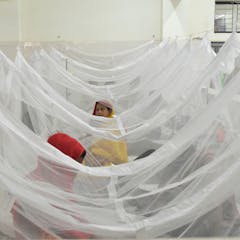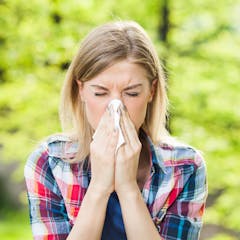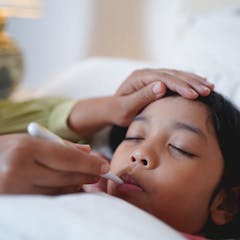
Articles on Infectious diseases
Displaying 21 - 40 of 483 articles

A British man is confirmed to have swine flu. The UK Health Security Agency said it is monitoring the situation closely.

Australia is one of the highest users of antibiotics in the developed world. So when do we actually need antibiotics to treat an infection? And when should we avoid them?

Millions of high-risk older Australians aren’t getting recommended vaccinations against COVID, the flu, pneumococcal disease and shingles.

We’ve all heard of antibiotic resistance. The same thing is happening with other causes of infections in humans: fungi, viruses and parasites. This is making thrush and other infections hard to treat.

In rural Ghana, only 18% of patients believe elephantiasis is a disease. Some others think it is caused by curses or even rain. Only by understanding local beliefs can it be treated effectively.

Viruses can get into cells in several ways. Figuring out how to stop them from entering in the first place is a key to developing better vaccines and stopping future pandemics.

Air purifiers were meant to save us from COVID. A new systematic review wonders where the evidence for that is.

Policymakers rely on models during uncertain times to figure out how their choices could affect the future. Over the pandemic, an ensemble of many COVID-19 models outperformed any one alone.

This is expected to be the smallest Omicron wave so far. But eligible older and vulnerable people are still recommended to have a booster.

New and innovative thinking is needed to deal with the reality on the ground in South Africa.

Cases of tuberculosis have been detected in South Australia over the past 17 months. Here’s what you need to know about the disease.

The human body has been making antivirals for eons, long before scientists did. A protein in your cells called viperin produces molecules that work similarly to the COVID-19 antiviral remdesivir.

Something unusual seems to be happening with dengue, a potentially fatal mosquito-borne viral disease.

COVID isn’t the only respiratory disease to leave the patient with long-term symptoms. Colds and flu can do the same.

Your cells die to keep you alive. Cell death does everything from fighting cancer cells and pathogens to forming your fingers and toes.

Many people at heightened risk for HIV have never been tested. Those who have self-tested for HIV often don’t go on to receive care or change their sexual behavior.

The answer might surprise you.

Warmer ocean waters are fueling the spread of the bacteria Vibrio vulnificus. Infections can lead to a rare but fatal condition called necrotizing fasciitis.

More than half the people who become infected with the Nipah virus die.

The heat and chills that come with fever are not only uncomfortable but also metabolically costly. Increased body temperature, however, can make all the difference when you’re sick.
